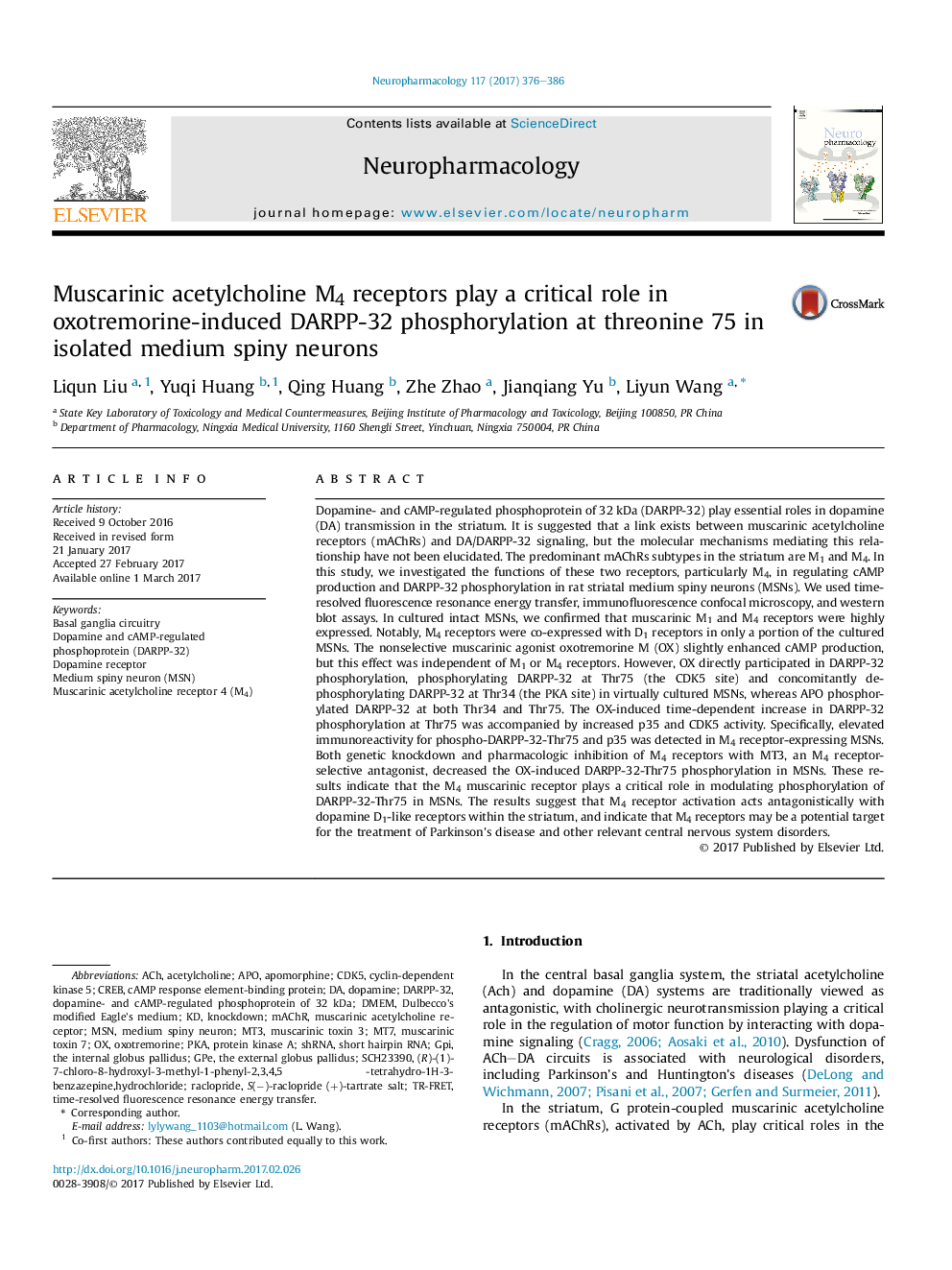| Article ID | Journal | Published Year | Pages | File Type |
|---|---|---|---|---|
| 5549083 | Neuropharmacology | 2017 | 11 Pages |
â¢mAchRs directly participate in DARPP-32 phosphorylation at Thr75 in striatal MSN.â¢Pharmacological and genetic suppression of M4 receptors reduce pDARPP-32-Thr75.â¢M4 receptor activation acts antagonistically with dopamine D1-like receptors within the striatum.â¢There is a potential therapeutic role for M4 receptors in Parkinson's disease.
Dopamine- and cAMP-regulated phosphoprotein of 32Â kDa (DARPP-32) play essential roles in dopamine (DA) transmission in the striatum. It is suggested that a link exists between muscarinic acetylcholine receptors (mAChRs) and DA/DARPP-32 signaling, but the molecular mechanisms mediating this relationship have not been elucidated. The predominant mAChRs subtypes in the striatum are M1 and M4. In this study, we investigated the functions of these two receptors, particularly M4, in regulating cAMP production and DARPP-32 phosphorylation in rat striatal medium spiny neurons (MSNs). We used time-resolved fluorescence resonance energy transfer, immunofluorescence confocal microscopy, and western blot assays. In cultured intact MSNs, we confirmed that muscarinic M1 and M4 receptors were highly expressed. Notably, M4 receptors were co-expressed with D1 receptors in only a portion of the cultured MSNs. The nonselective muscarinic agonist oxotremorine M (OX) slightly enhanced cAMP production, but this effect was independent of M1 or M4 receptors. However, OX directly participated in DARPP-32 phosphorylation, phosphorylating DARPP-32Â at Thr75 (the CDK5 site) and concomitantly de-phosphorylating DARPP-32Â at Thr34 (the PKA site) in virtually cultured MSNs, whereas APO phosphorylated DARPP-32Â at both Thr34 and Thr75. The OX-induced time-dependent increase in DARPP-32 phosphorylation at Thr75 was accompanied by increased p35 and CDK5 activity. Specifically, elevated immunoreactivity for phospho-DARPP-32-Thr75 and p35 was detected in M4 receptor-expressing MSNs. Both genetic knockdown and pharmacologic inhibition of M4 receptors with MT3, an M4 receptor-selective antagonist, decreased the OX-induced DARPP-32-Thr75 phosphorylation in MSNs. These results indicate that the M4 muscarinic receptor plays a critical role in modulating phosphorylation of DARPP-32-Thr75 in MSNs. The results suggest that M4 receptor activation acts antagonistically with dopamine D1-like receptors within the striatum, and indicate that M4 receptors may be a potential target for the treatment of Parkinson's disease and other relevant central nervous system disorders.
Graphical abstractSchematic representation of the regulation of DARPP-32 by D1 or M4 activation. D1 activation, induced by DA, stimulates adenylyl cyclase and increases the production of cAMP in striato-nigral/Gpi and striato-Gpe neurons, respectively. The M4 muscarinic receptor plays a critical role in modulating phosphorylation of DARPP-32Â at Thr75, producing antagonistic effects on dopamine D1 receptor/DARPP-32-Thr34 signaling. These effects intensify the phosphorylation of DARPP-32Â at Thr75 and the inhibition of the cAMP/PKA cascade.Download high-res image (186KB)Download full-size image
